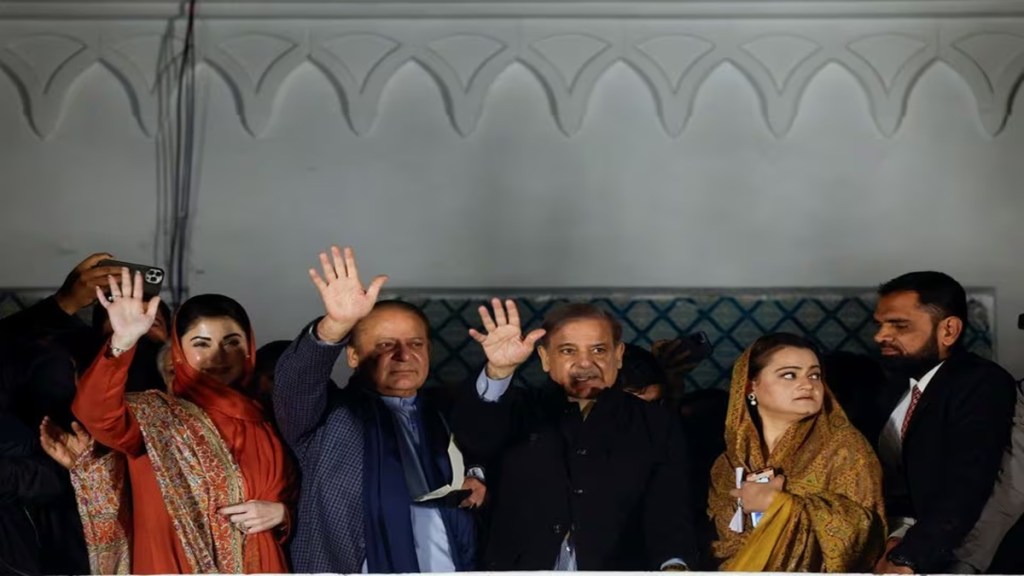Shehbaz Sharif, the younger brother of former Prime Minister Nawaz Sharif, is anticipated to assume the role of Pakistan’s new prime minister. This expectation arises from the coalition formed by them, comprising major political parties, poised to comfortably surpass the simple majority threshold to establish the next government. Following elections that resulted in a divided mandate, the Pakistan Muslim League-Nawaz (PML-N) surprised many on Tuesday night by nominating Shehbaz as the candidate for prime minister instead of their party leader and three-time former premier, Nawaz Sharif.
Shehbaz Sharif’s surprise nomination
In an unexpected turn of events, the Pakistan Muslim League-Nawaz (PML-N) named Shehbaz as the prime ministerial candidate instead of the party’s chief, Nawaz Sharif.
Shehbaz, alongside Asif Ali Zardari of Pakistan Peoples Party and Khalid Maqbool Siddiqui of Muttahida Qaumi Movement Pakistan (MQM-P), convened at the residence of Shujaat Hussain of Pakistan Muslim League-Quaid (PML-Q) for a consultative meeting to chart the course for government formation.
Expressing unity, Shehbaz praised the collaboration among parties in accepting the split mandate. The coalition, according to him, enjoys an “almost 2/3 majority” in Parliament post-elections.
Key Party Support
The PML-N, PPP, MQM-P, PML-Q, IPP, and Balochistan Awami Party (BAP) have joined forces under Shehbaz’s leadership. Together, they command 152 general seats, positioning them well to secure the minimum required 169 seats for government formation, accounting for additional women and minority seats.
The Number Game
Shehbaz, aged 72, who previously held the position of prime minister following the ousting of the Imran Khan-led government in April 2022, asserted that the coalition formed by the PML-N and allied parties commands an “almost 2/3 majority” in Parliament following the recent elections. He expressed confidence that the new government would tackle the nation’s challenges, particularly focusing on stabilizing the economy. The total number of general seats secured by the six parties, including PML-N, PPP, MQM-P, PML-Q, IPP, and BAP, set to form a coalition under Shehbaz’s leadership, stands at 152, according to the Election Commission of Pakistan’s count. This suggests that they will comfortably exceed the minimum required number of 169 seats, with additional seats reserved for women and minorities. However, achieving the elusive two-thirds majority of 224 seats in the 336-member National Assembly remains uncertain.
United Front
Shehbaz emphasized the importance of national unity in addressing the country’s challenges, and it’s reported that the PML-N enjoys support from the influential Pakistan Army. Reacting to these developments, the incarcerated former prime minister Imran Khan’s PTI party urged the PML-N to gracefully accept defeat and allow Imran Khan to lead the country’s recovery. PTI claims to have won 180 seats nationwide and plans to announce its prime ministerial candidate soon. Shehbaz and Zardari confirmed plans to establish a coalition government aimed at resolving economic crises and fostering reconciliation with all parties, including Imran Khan’s PTI.
With major parties aligning to form a new government, the transition is expected to proceed according to legal procedures by the end of the month. Meanwhile, the PPP stated its inability to form a government independently and expressed readiness to support key initiatives to restore political stability. The PTI decided to collaborate with religious parties to strengthen its position in forming the federal government and provincial governments. By joining these parties, PTI aims to secure a share of reserved seats in the assemblies, although the move may face scrutiny due to the background of the chosen parties. Despite challenges, these developments indicate progress toward establishing an elected government following the polarizing elections on February 8.
(With PTI Inputs)

